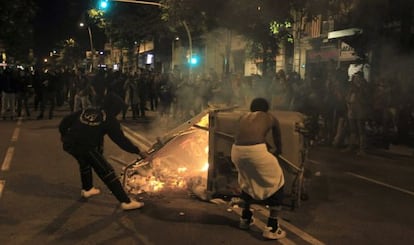Barcelona mayor halts squat demolition after fourth night of rioting
Another 23 people arrested as 3,000 join in renewed protests Residents announce plans to rebuild demolished Can Vies center

Barcelona City Hall has temporarily halted the demolition of Can Vies, the squatted social center that has been at the heart of a violent four-day confrontation between street protestors and riot police.
The sudden decision to call off the diggers is meant as a sign that city officials want to go back to the negotiating table with the squatters, who were evicted from the premises they had occupied for the last 17 years on Monday.
“The city maintains its willingness to find a negotiated solution that is satisfactory to all parties involved,” said local authorities in a press release.
This was the straw that broke the camel’s back. This goes beyond Can Vies”
But the squatters held a press conference to announce that “negotiations were broken when the city ordered the eviction of Can Vies and began the demolition when there were still people inside.”
Can Vies spokesman Pau Guerra said his group would attempt to rebuild the center, which is located in the Sants neighborhood of the city, beginning Saturday morning. He also called for the resignation of Mayor Xavier Trias and district councilor Jordi Martí.
Can Vies, which is the property of the municipal transport authority, Transports Metropolitans de Barcelona (TMB), had grown to become a point of reference for alternative social movements and a generator of cultural activities in the community.
The forcible eviction and partial demolition of the site triggered widespread street protests on Monday, with thousands of demonstrators taking to the streets. A few groups have been setting up barricades, damaging street furniture, setting trash containers on fire and smashing store-front windows. Several dozen arrests were made after protestors hurled rocks and other objects at the riot police.
But local authorities began to get nervous on Thursday, after shows of support for the demonstrators from local residents. Authorities worried that Sants could turn into another El Gamonal, the district in the northern Spanish city of Burgos that made headlines after angry residents managed to halt a project for an underground parking lot through sustained street protests. There is also some concern that the demonstrations could spark wider protests across the city.
Fourth night of rioting
On Thursday evening over 3,000 people gathered in Sants to demand the release of 30 people arrested during the violent street protests of previous days.
The march was peaceful until 11pm, when a small group of violent activists set trash containers on fire, hurled stones and smashed bank windows in the presence of riot officers from the regional police force, the Mossos d’Esquadra. Rioters also damaged street furniture, including telephone booths, bus shelters and fences.
A further 23 people were detained as a result of the incidents, while the riot police cordoned off access to Plaza de España, where the protestors had intended to head.
But support for the squatters has been growing on the back of a deeper feeling of discontent towards politicians and the economic crisis.
“This was the straw that broke the camel’s back. This goes beyond Can Vies,” said Alfonso Romero, a 63-year-old member of the Yayoflautas – a loose association of disgruntled seniors who carry out street protests and sit-ins to demand better public healthcare, housing and transport services.
“We are protesting because politicians want a different Barcelona from the one the citizens want. They want a luxury city filled with tourists and wealthy people. But when we go to the city center, we can’t afford to buy anything at those prices,” added Romero, wearing his yellow Yayoflauta vest.
Tu suscripción se está usando en otro dispositivo
¿Quieres añadir otro usuario a tu suscripción?
Si continúas leyendo en este dispositivo, no se podrá leer en el otro.
FlechaTu suscripción se está usando en otro dispositivo y solo puedes acceder a EL PAÍS desde un dispositivo a la vez.
Si quieres compartir tu cuenta, cambia tu suscripción a la modalidad Premium, así podrás añadir otro usuario. Cada uno accederá con su propia cuenta de email, lo que os permitirá personalizar vuestra experiencia en EL PAÍS.
¿Tienes una suscripción de empresa? Accede aquí para contratar más cuentas.
En el caso de no saber quién está usando tu cuenta, te recomendamos cambiar tu contraseña aquí.
Si decides continuar compartiendo tu cuenta, este mensaje se mostrará en tu dispositivo y en el de la otra persona que está usando tu cuenta de forma indefinida, afectando a tu experiencia de lectura. Puedes consultar aquí los términos y condiciones de la suscripción digital.








































